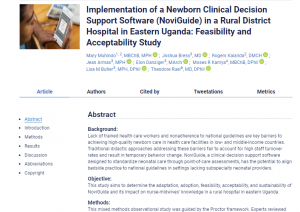
Background
Lack of trained health care workers and nonadherence to national guidelines are key barriers to achieving high-quality newborn care in health care facilities in low- and middle-income countries. Traditional didactic approaches addressing these barriers fail to account for high staff turnover rates and result in temporary behavior change. NoviGuide, a clinical decision support software designed to standardize neonatal care through point-of-care assessments, has the potential to align bedside practice to national guidelines in settings lacking subspecialty neonatal providers.
Objective
This study aims to determine the adaptation, adoption, feasibility, acceptability, and sustainability of NoviGuide and its impact on nurse-midwives’ knowledge in a rural hospital in eastern Uganda.
Methods
This mixed methods observational study was guided by the Proctor framework. Experts reviewed the clinical content of NoviGuide to ensure fidelity to Uganda guidelines. We enrolled nurses and midwives providing newborn care at Tororo District Hospital, trained them on NoviGuide use, and followed them for 12 months. We assessed adoption, feasibility, acceptability, and sustainability by analyzing NoviGuide use data, comparing it with maternity registry data and administering the System Usability Scale (SUS) and the Center for Health Care Evaluation Provider Satisfaction Questionnaire. We compared the mean knowledge assessment score at baseline, 6 months, and 12 months using a two-tailed t test.